
Vol.1, Issue 2, 2022
Infrastructure Quarterly

Professor Chandan Chowdhury, Executive Director, PLIIM
Punj Lloyd Institute of Infrastructure Management (PLIIM) is established within the Indian School of Business as a specialist Institute to support its infrastructure. The institute has the MIT Sloan School of Management as its associate partner. The vision and mission of the institute are:
Vision
To create high-quality leadership and management capacity for the infrastructure sector and understand the sustainability dimensions impacting the industry by delivering quality education, contextual research, and continuous outreach.
Mission

- Create top-quality educational and training programmes
- Facilitate learning through online programmes
- Undertake research that is contextual to India and other developing countries
- Develop tools and decision support systems to support the infrastructure practice
- Undertake continuous outreach to support the sector
- Serve as a “Go to” place for the infrastructure sector in India and abroad.
The Punj Lloyd Institute undertakes various initiatives to guide the infrastructure sector towards efficient and sustainable development through research initiatives, knowledge-sharing events, public officials, and industry professionals’ training. It has already developed a smart-cities index and digitalisation index. The institute works closely with corporates in all three verticals, Education, Outreach, and Research, to meet its vision. A brief on various activities of the institutes is given below.
Research
The PLIIM team submitted a proposal to Panchkula Metropolitan for ‘Developing Panchkula as a Net-Zero Carbon City.’ The proposal involves a three-year collaboration plan for preparing a roadmap for Panchkula to reach a net-zero target. The brief details are:
PMDA PROPOSAL: DEVELOPING PANCHKULA AS A NET-ZERO CARBON CITY
Background and Significance of the Study: Climate action in cities is essential for achieving ambitious net-zero emissions goals. Cities account for more than 50% of the global population, 80% of global GDP (Gross Domestic Product), two-thirds of global energy consumption and more than 70% of annual global carbon emissions.
Objectives of the Collaboration
The three-year collaboration plan will involve the activities defined below: •
- Prepare a roadmap for a city to reach the net-zero target
- Apply the roadmap to the Panchkula Metropolitan City
- Prepare an action plan to mitigate the impact of the five significant emission drivers in Panchkula.
Scope of the research project
The scope of the research project is to develop a model for an Indian city to achieve net-zero status by focusing on
- Education (capacity building)
- Research
- Outreach (workshops, seminars, roundtables, etc.)
- Entrepreneurship (identifying and guiding startup companies in the areas of net-zero journey)
Methodology
ISB's proposal covering five intervention strategies for making a Smart Net-zero city is depicted in Figure 2. Upon implementation of ISB's proposal, the city is expected to become more livable and sustainable.
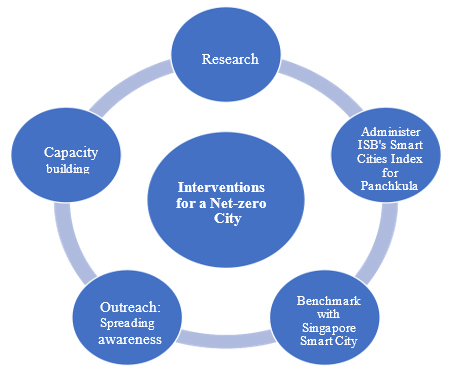
Education
AMPI Co21 and Co22 Graduation
ISB celebrated its combined graduation ceremony for PGPCo20 and Advanced Management Programmes (Class of 2020 and 2021) in Healthcare Management, Infrastructure, Public Policy, and Manufacturing. It was held on the 1st of April 2022 from 3.00 PM to 6.30 PM at the Mohali Campus of ISB. Forty-six professionals of the Advanced Management Programme for Infrastructure graduated in the ceremony. Mr Dushyant Chautala Deputy CM of Haryana presided over the ceremony as the Chief Guest and handed the certificates to the students along with Mr Rakesh Bharti Mittal, Vice-Chairman, Bharti Enterprises, and Chairman, Mohali Campus Advisory Board, and Dean Madan Pillutla.

AMPI: Co2022
The sixth offering of the Advanced Management Programme (AMPI) commenced its first residency from 22nd April to 1st May 2022 at the Hyderabad Campus. We have 35 students in our Co2022 Advanced Management Programme for Infrastructure. The cohort has an average experience of 12.8 years, representing a mix of middle, senior, and top management. Our 35 students come from the following organisations:
| 1. Vassar Labs |
| 2. National Institute of Urban Affairs |
| 3. Landmark Concepts Pvt. Ltd. |
| 4. Manipal Health Enterprises Pvt Ltd |
| 5. Shell India Markets Pvt. Ltd. (Karachaganak Petroleum Operating) |
| 6. Godrej Properties Ltd |
| 7. New Apex Infra Pvt. Ltd. |
| 8. World Water Works India Private Limited |
| 9. Haryana Power Generation Corporation Limited |
| 10. Jacobs Engineering Group |
| 11. Haryana Power Generation Corporation Limited |
| 12. National Institute of Urban Affairs |
| 13. National Institute of Urban Management |
| 14. Krivan Koncepts |
| 15. Haryana Power Generation Corporation Limited |
| 16. Sunshine Ventures |
| 17. Civtect India Private Limited |
| 18. HPGCL |
| 19. Maple Leaf Advisory |
| 20. RGC Pvt Ltd |
| 21. Housing Development Finance Corporation Limited |
| 22. Ablerr Realtors LLP |
| 23. Canara Bank and The West Investor |
| 24. Samander Dass International Private Limited |
| 25. Dakkhin Engineers and Infrastructures P Ltd |
| 26. Suncrest Logistics Park Pvt. Ltd |
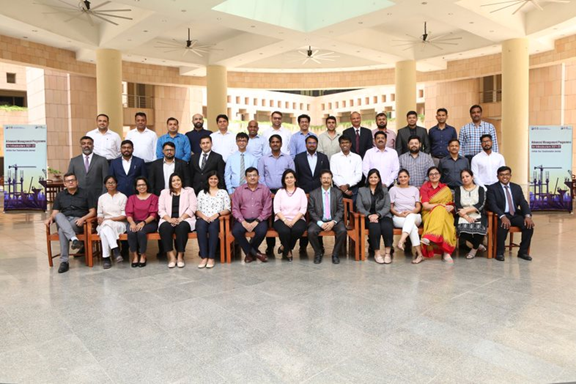
Action Learning Projects (ALPs)
Details of ALPs: AMPI Co2022
It is our endeavour to take the ALPs to the next level. Here we give a brief description of each of the projects of the current cohort of AMPI.
1. Climate-Smart EV charging stations in Haryana:
The ALP team has the objective to enable faster adoption of electric vehicles by ensuring a safe, reliable, accessible, and affordable charging infrastructure ecosystem under Atma Nirbhar Bharat. It would also allow HPGCL (Haryana Power Generation Corporation Limited) a first-mover advantage and an alternate revenue stream in an upcoming sector. The outcome of the ALP will be an implementable business model for establishing a climate-smart EV charging station in Haryana.
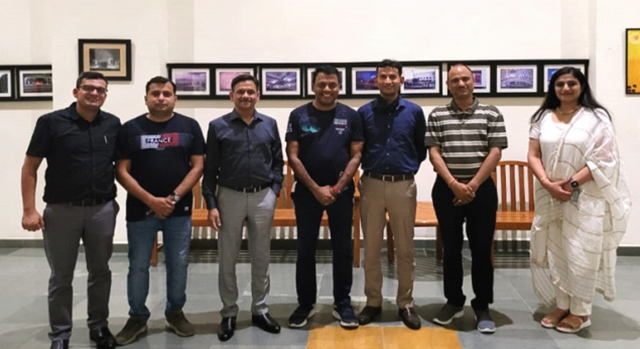
Team members: All the team members come from HPGCL.
- Amina Chawla (Spokesperson)
- Surinder Singh
- Amit Gupta
- Rohitash Bansal
- Vikas Bansal
- Sandeep Makhija
- Tanuj Verma
2. Strategic framework for Net Zero carbon cities:
The Government has laid milestones to achieve a target of net-zero emissions by 2070. It involves enhancing non-fossil energy capacity to 500 GW by 2030, reducing carbon emissions by 1 billion tonnes by 2030, and meeting 50% of the country's energy requirements through renewable energy by 2030.
The ALP team is looking to identify a benchmark city and assess its net-zero capability using frameworks that utilise five components:
- Energy and green buildings
- Urban planning, green cover, and biodiversity
- Mobility & air quality
- Water resource management
- Waste management.
The outcome of the ALP would be an implementable framework to achieve a NetZero carbon city. The team will present their findings to relevant government authorities.
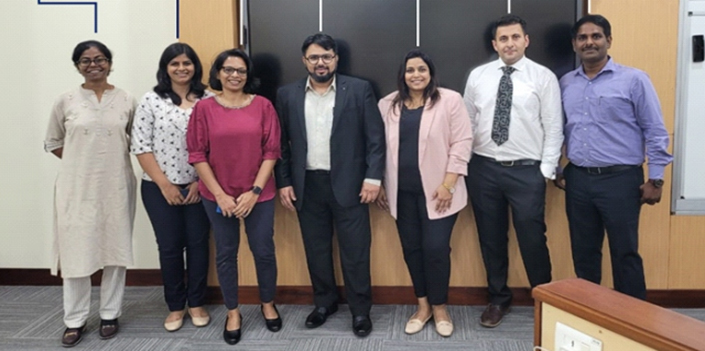
Team members:
- Naim Kerala
- Srivani Nerella
- Thiyagarajan N
- Anusha Suryanarayanan
- Anurag Gulati
- Minu J
- Priya Bendarkar
3. Developing a framework for battery swapping Infrastructure for commercial EV vehicles on the highway network:
The team intends to develop the ideal battery swapping framework for commercial vehicles on the Delhi-Jaipur highway. They will also consider alternative revenue generation models and minimise the charges to the customer. The team will work on the cost of ownership of batteries to customers and the battery swapping stations. They will also study the battery interoperability standards framework. The ALP outcome would be the development of an implementable framework for battery swapping for commercial vehicles on highways.
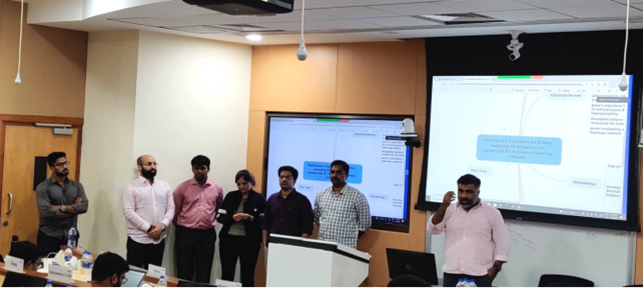
The team members of ALP are:
- Keerti Bongu
- Shashanka Nanda
- Poonamdeep Minhas
- Vipul Ovhal
- Bilal Abdul Sathar
- Nakul Dahiya
- Santhana Krishnan Raghurama
4. Opportunities and problem solving through digital transformation in the highway Infrastructure sector:
The highway sector in India is rapidly growing with high priority accorded by the Government in developing high-quality roads. All stakeholders face numerous challenges during the pre-bid, execution, and post-execution phases.
The team intends to analyse new technologies and employ them to improve the management of roads in the execution phase. It would involve daily monitoring, workforce optimisation, quality control, smart billing, intelligent traffic control, and environmental and safety monitoring by employing Artificial Intelligence, the Internet of Things, and other new-age tools. The outcome of the ALP will be a framework to use new-age technology in the execution phase of road construction to bring efficiencies.
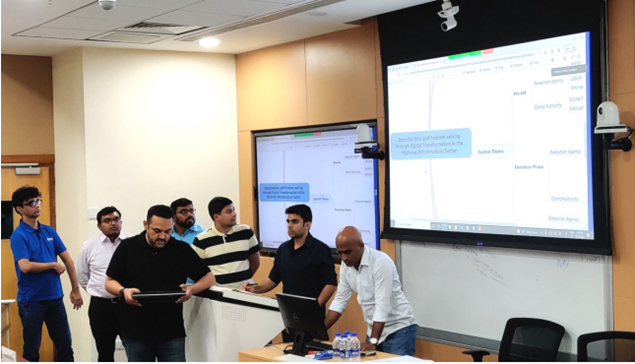
The team members of ALP are:
- Rajesh Varma Bhupatiraju
- Amit Khurana
- Rijish Ganguly
- Nikhil Behr
- Subramanya Urala K R
- Aritra Nandy
- Ramkrushna Galdha
5. Integrated infrastructure approach for accelerating sustainable economic growth in Telangana:
Telangana needs to re-invent and re-position itself as a Global Economic Hub to move up the value chain. The state needs an anchor industry and its ancillaries to achieve accelerated growth. The team intends to identify the target industry based on secondary data provided by the state department and study its implementation framework to include quantification of needs, funding strategy, etc. The outcome of the ALP will be a roadmap (for the target industry) for the Government to translate its vision into reality.
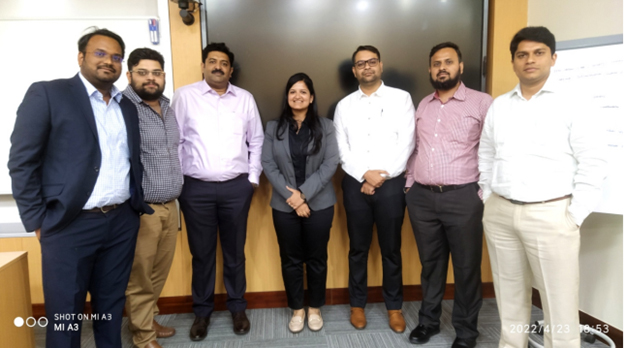
The team members of ALP are:
- Harish Pasupuleti
- Tanuj Thammanna
- Ravi Uma Gayatri
- Eshwar Keesara
- Karthik Ramamoorthy
- Saurabh Bhankhor
- Dishant Jai
Global Management Programme for Infrastructure (GMPI)
ISB, in collaboration with Coursera, has launched the online GMPI for a global audience. The link is available at https://www.coursera.org/degrees/gmp-infrastructure-isb . There has been an increased demand for professionals skilled in infrastructure, real estate, and design. The GMPI provides an excellent opportunity for middle and senior-level executives to appreciate the modern concepts of management in their Infrastructure and Real Estate initiatives. The programme will also have a state-of-the-art curriculum based on ISB’s global faculty’s research. One of the essential aspects of the GMPI is a good mix of theory and practice.
The first cohort of the programme will commence in October 2022. The application form of GMPI went live on 21st June 2022 on the Coursera platform. As of 30th June 2022, there were 34 applications in progress.
Outreach
AMPI Networking Dinner with Alumni: We organised a get-together (dinner) at the Hyderabad campus on 30th April 2022 for the AMPI cohort. We had also invited a few Hyderabad-based AMPMO and AMPI alumni to rekindle old memories.

Speaker Sessions
Faculty Master Class by Mr NVS Reddy, Managing Director-Hyderabad Metro Rail Limited

Mr. NVS Reddy
Topic: Seven-year journey of Hyderabad Metro Rail Mr Reddy interacted with the students of AMPI at the Hyderabad campus of ISB. He gave a fascinating talk on the seven-year journey of Hyderabad Metro Rail as it transformed from a failed investment to an infrastructure gem. He spoke of his challenges and hurdles and how the team spirit, astute leadership, and intense perseverance enabled him to overcome obstacles. The 90-minute lecture to the students of AMPI left them spellbound and asking for more.
Punj Lloyd Institute of Infrastructure Management
Indian School of Business, Knowledge City,
Sector 81, Mohali 140306.



